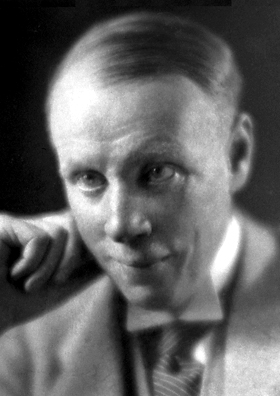
Harry Sinclair Lewis was an American novelist, short-story writer, and playwright. In 1930, he became the first author from the United States to receive the Nobel Prize in Literature, which was awarded "for his vigorous and graphic art of description and his ability to create, with wit and humor, new types of characters." Lewis wrote six popular novels: Main Street (1920), Babbitt (1922), Arrowsmith (1925), Elmer Gantry (1927), Dodsworth (1929), and It Can't Happen Here (1935).

The Wonderful Wizard of Oz is a 1900 children's novel written by author L. Frank Baum and illustrated by W. W. Denslow. It is the first novel in the Oz series of books. A Kansas farm girl named Dorothy ends up in the magical Land of Oz after she and her pet dog Toto are swept away from their home by a cyclone. Upon her arrival in the magical world of Oz, she learns she cannot return home until she has destroyed the Wicked Witch of the West.

A sequel is a work of literature, film, theater, television, music, or video game that continues the story of, or expands upon, some earlier work. In the common context of a narrative work of fiction, a sequel portrays events set in the same fictional universe as an earlier work, usually chronologically following the events of that work.

Literature about World War I is generally thought to include poems, novels and drama; diaries, letters, and memoirs are often included in this category as well. Although the canon continues to be challenged, the texts most frequently taught in schools and universities are lyrics by Siegfried Sassoon and Wilfred Owen; poems by Ivor Gurney, Edward Thomas, Charles Sorley, David Jones and Isaac Rosenberg are also widely anthologized. Many of the works during and about the war were written by men because of the war's intense demand on the young men of that generation; however, a number of women created literature about the war, often observing the effects of the war on soldiers, domestic spaces, and the home front more generally.
Julie Victoria Jones is an American/British fantasy author.

The Shaggy Dog is a 1959 American fantasy comedy film produced by Walt Disney Productions and loosely based on the 1923 novel The Hound of Florence by Felix Salten. Directed by Charles Barton from a screenplay by Lillie Hayward and Bill Walsh, the film stars Fred MacMurray, Tommy Kirk, Jean Hagen, Kevin Corcoran, Tim Considine, Roberta Shore, and Annette Funicello. The film follows a teenage boy named Wilby Daniels who, by the power of an enchanted ring of the Borgias, is transformed into a shaggy Old English Sheepdog.
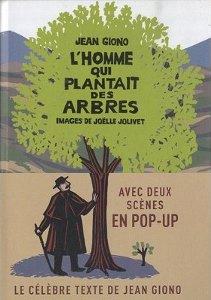
The Man Who Planted Trees, also known as The Story of Elzéard Bouffier, is an allegorical tale by French author Jean Giono, published in 1953. It tells the story of one shepherd's long and successful singlehanded effort to re-forest a desolate valley in the foothills of the Alps, near Provence, throughout the first half of the 20th century. It was written in French, and first published in English. The story has become known worldwide and is seen as an inspiration for ecological regeneration brought about by man. In 1988, Frédéric Back won an Academy Award for the animated short film The Man Who Planted Trees. The film was published in two versions, French and English, and narrated respectively by actors Philippe Noiret and Christopher Plummer.
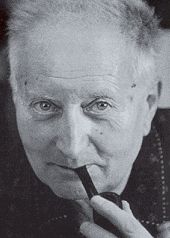
Jean Giono was a French writer who wrote works of fiction mostly set in the Provence region of France.
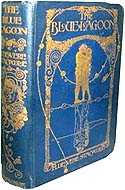
The Blue Lagoon is a coming-of-age romance novel written by Henry De Vere Stacpoole, first published by T. Fisher Unwin in 1908. The Blue Lagoon explores themes of love, childhood innocence, and the conflict between civilisation and the natural world.
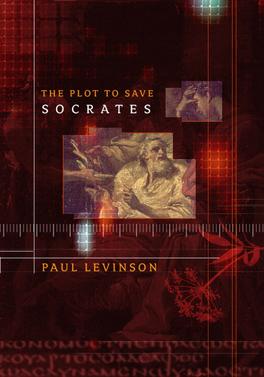
The Plot to Save Socrates is a time travel novel by Paul Levinson, first published in 2006. Starting in the near future, the novel also has scenes set in the ancient world and Victorian New York.
Pauline Clarke was an English author who wrote for younger children under the name Helen Clare, for older children as Pauline Clarke, and more recently for adults under her married name Pauline Hunter Blair. Her best-known work is The Twelve and the Genii, a low fantasy children's novel published by Faber in 1962, for which she won the 1962 Carnegie Medal, the Lewis Carroll Shelf Award, and the 1968 Deutscher Jugendliteraturpreis.
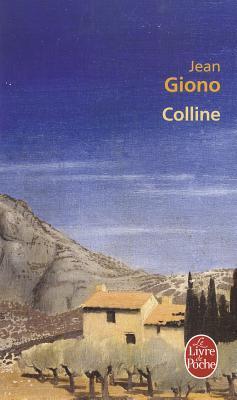
Colline is a 1929 novel by the French writer Jean Giono. It has also been published as Hill of Destiny. It tells the story of a small hamlet in Provence where the superstitious residents struggle against nature, as their settlement is struck by several misfortunes. Colline was Giono's debut novel. It is the first installment in the author's Pan trilogy; it was followed by the standalone novels Lovers are Never Losers and Second Harvest.

Timothée de Fombelle is a French author and playwright.

Joy of Man's Desiring is a 1936 novel by the French writer Jean Giono. The story takes place in an early 20th-century farmer's community in southern France, where the inhabitants suffer from a mysterious disease, while a healer tries to save them by teaching the value of joy. The title is taken from Johann Sebastian Bach's chorale Jesu, Joy of Man's Desiring. An English translation by Katherine Allen Clarke was published in 1940.

The Foundling's War is a 1977 novel by the French writer Michel Déon. Its French title is les Vingt ans du jeune homme vert, which means "the twenty years of the green young man". It is set in occupied Paris during World War II and follows a young man who grew up as an adoptive child and navigates through the social turmoil around him.
Un roi sans divertissement, published in English as A King Alone, is a 1947 novel by the French writer Jean Giono. The narrative is set between 1843 and 1848 in the French Prealps and follows a police officer who discovers unpleasant truths about himself during a murder investigation. It was the first book by Giono to be published after World War II and marks the beginning of a new phase in the author's oeuvre.

The Song of the World is a 1934 novel by the French writer Jean Giono. The narrative portrays a river and human vendettas as a part of nature. The story contains references to the Iliad. Its themes and view on nature were heavily inspired by Walt Whitman's poetry collection Leaves of Grass. It was adapted into the 1965 film Le Chant du monde, directed by Marcel Camus.
Lovers Are Never Losers is a 1929 novel by the French writer Jean Giono. It tells a love story set in rural France in the early 20th century. It is the standalone second entry in Giono's Pan trilogy; it was preceded by Colline and followed by Second Harvest. It was published in English in 1931, translated by Jacques Le Clercq.

The Malediction is a 1952 novel by the French writer Jean Giono. It tells the story of a landowning family in Provence. The family suffers under a curse which takes different forms over the generations. An English translation by Peter de Mendelssohn was published in 1955.
Ralph Dennis was an American author of crime fiction, best known for his Hardman series of detective novels. The writer and anthologist Ed Gorman described him as "the most beloved obscure private eye writer who ever lived".















